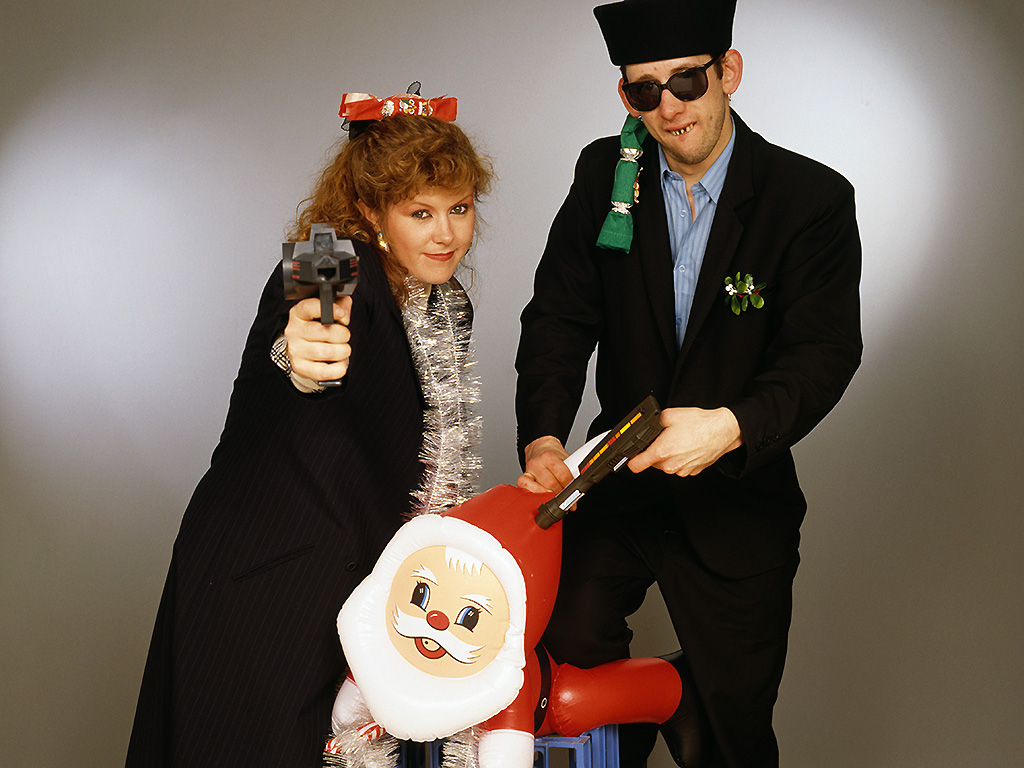Just like Die Hard is barely a Christmas movie (it is, isn’t it?), The Pogues’ best-known song has a tenuous yuletide connection at best — and it’s hardly the happiest song ever written. Yet it remains wildly popular (and tremendously profitable) decades after it first appeared.

The song was born sometime in 1985 when Jem Finer, the Pogues’ banjo player, started messing about with an idea. Lore has it that Elvis Costello, the band’s producer at the time, dared the band to write a Christmas song. Finer showed it to singer Shane McGowan who liked it but he really wasn’t sure what he could do with it.
READ MORE: Women-only Swedish music festival found guilty of discrimination
For the next two years, Jem and Shane struggled with the song through multiple iterations. Coming up with the lyrics was especially difficult. The original idea was to tell the story of a sailor heading to distant seas, but that didn’t seem to work. The song was abandoned.
A few months later, in March 1986, the song was resurrected after Shane read a book from 1973 entitled A Fairytale of New York by JP Donleavy that Finer had left around the studio. It told the story of an Irishman returning to New York after going to school in Ireland. This — and copious amounts of sherry — somehow helped morph the song from being about a lonely sailor to one about a drunken couple slugging it out on Christmas Eve. (The book’s hero, Cornelius Christian, ends up getting into a brawl with a hooker.)
This next version — which for a time was called Christmas Eve in the Drunk Tank — was good, but not quite good enough. Besides, a new problem arose: who could they get to find the female half of the duet? Shane had written these new lyrics with Pogues bass player Cait O’Riordan in mind, but in the interim, she had run off and married Elvis Costello, which also marked the end of his time as the Pogues’ producer. The song was shelved again.
READ MORE: First look at Disney’s 2019 live-action version of ‘Aladdin’

Get daily National news
A year later — it’s now March 1987 — the Pogues tried again with Shane singing both male and female parts during a session at Abbey Road in London. That was never intended to be the final version, but the band needed to get something down on tape just to keep things moving forward.
The third round of demo recordings was held at RAK Studios in London in August, still without a working theory about what to do with the female vocal.
That demo was part of the sessions for what would become the Pogues’ third album If I Should Fall from Grace With God. The producer of that album, Steve Lillywhite, was famous for having helped U2 through their first three albums along with projects ranging from Joy Division to Psychedelic Furs to Simple Minds. He liked the song a lot but was likewise stumped when it came to finishing it off.
Who could they get to sing the female part? “Chrissie Hynde!” Shane said. But for whatever reason, she wasn’t available.
Fortunately, though, Steve was married to singer Kirsty MacColl, an acclaimed singer in her own right with a series of solo albums. In the summer of 1987, Steve asked, “Honey, would you mind singing the female parts on this demo? We don’t know what to do with this song and maybe if we get an actual woman on it we’ll come up with some ideas.”
WATCH BELOW: Eleanor Beaton weighs in on the controversy surrounding the holiday classic ‘Baby It’s Cold Outside’

So she did. Kirsty went into her husband’s home studio one night, laid down her parts on her own — Shane was nowhere to be seen — and then went back to look after the kids. This was supposed to be just a guide vocal, a stopgap measure until a suitable singer could be found.
When the Pogues had heard what Kirsty had done, they were amazed. “That’s it! We’ve cracked it!”
Shane re-did his parts — again without Kirsty being present — followed by some editing and mixing magic by Steve and it was done.
The song was released in December 1987, accompanied by a video starring Matt Dillion and shot in a real police precinct on the Lower East side of Manhattan. There was a slight problem when it was discovered that the NYPD doesn’t actually have a choir, but it does have an Irish pipe band.
A second crisis arose when everyone realized the pipe band didn’t know Galway Bay. No problem, though, since whatever they played didn’t have to be heard in the video. So they just played a piece they knew: the Mickey Mouse Club March. The video of them vamping on Mickey Mouse was later slowed down to fit the beat.
And despite occasional controversy over some of the language in the lyrics (it happened again this year), it has since become one of the greatest modern Christmas songs of all time — even though it’s really not about Christmas, of course.
Bonus fun fact: Shane McGowan was born on Christmas Day 1957.
—
Alan Cross is a broadcaster with 102.1 the Edge and Q107, and a commentator for Global News.
Subscribe to Alan’s Ongoing History of New Music Podcast now on Apple Podcast or Google Play










Comments